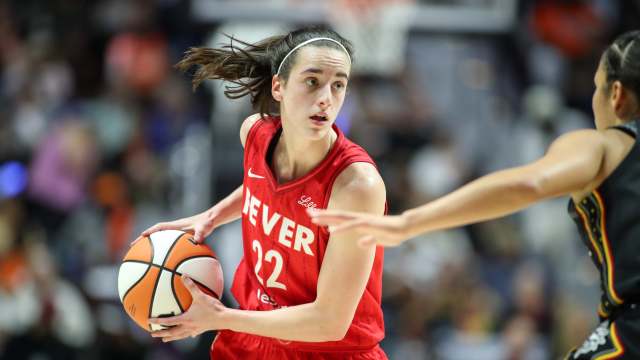Allison Barber reveals an ‘amazing’ anecdote about Caitlin Clark.

The Indiana Fever’s season came to an abrupt end after losing to the Connecticut Sun in the first round of the 2024 WNBA playoffs. However, the Fever’s future remains bright.
With Fever guard Caitlin Clark, the league’s Rookie of the Year, more than living up to the hype as the No. 1 overall pick, and the team’s exponential improvement as the season progressed, Indiana should be a force next season.
While the Fever’s roster may undergo changes in free agency, the organization’s front office will look different as well. Allison Barber, who’s served as the Fever’s President and COO since 2019, announced she was stepping down at the end of the season.

Before the end of her tenure, Barber spoke at the Economic Club of Washington D.C.’s event, during which she revealed a little known fact about the Fever’s rookie phenom.
Before the end of her tenure, Barber spoke at the Economic Club of Washington D.C.’s event, during which she revealed a little known fact about the Fever’s rookie phenom.
While the “Caitlin Clark effect” was a major topic of conversation throughout the season, as her presence fueled record-breaking attendance numbers, even at away games, no one knew the 22-year-old tried to get her opponents to financially benefit from the sold-out crowds.
“Since this off the record, here’s all you need to know about Caitlin Clark,” Barber told the Club on September 19. “When we would go to away games, they would always sold out. Unbelievable. So, Atlanta [Dream] would normally have 3,000 or 4,000 people, now they have 17,000 people,” which didn’t even include standing room tickets.

“After a few away games, Caitlin asked the WNBA if they would pay spot bonuses to the away team players,” Barber continued. “She said, ‘We’re making all this new revenue, and I would like the away team to benefit from that. Could they get a spot bonus?’ So, that’s the heart of Caitlin Clark. That’s a classy, amazing person.”
While the WNBA ultimately said no due to the collective bargaining agreement, Clark tried.
News
Emma Raducanu accepts Qatar Open wildcard as Brit seeks to end losing streak
Emma Raducanu has accepted a late wildcard to play the Qatar Open in Doha. Emma Raducanu has lost all of her last three matches (Image: Getty) Emma Raducanu has accepted a late wildcard to play next week’s Qatar Masters as she bids…
Emma Raducanu’s schedule unclear after losing three matches in a row
Emma Raducanu’s schedule is up in the air following her Abu Dhabi Open exit. Emma Raducanu’s schedule is uncertain following her Abi Dhabu defeat (Image: Getty) Emma Raducanu’s upcoming WTA Tour schedule remains up in the air. The Brit has lost her last…
Daniil Medvedev involved in very tense moment with rival after body hit
Daniil Medvedev was involved in an uneasy flashpoint at the Rotterdam Open. Daniil Medvedev flashed a stern look at Mattia Bellucci at the end of the point (Image: TENNIS TV) Daniil Medvedev flashed a steely look at Mattia Bellucci after the Italian…
Tennis star Danielle Collins shades critics with latest ‘kiss my a–‘ video in Bahamas
Danielle Collins has made good on her promise to rub Australia’s face in it. The former Australian Open finalist was booed off court after her third round defeat to eventual champion Madison Keys after the Melbourne crowd turned on her. The hot-headed…
Tennis fans stunned after Zizou Bergs tackled Cristian Garin during Davis Cup — and still won: ‘Shocking decision’
The Davis Cup tie between Belgium and Chile descended into chaos after a Belgian player won his match despite shoulder-charging his opponent, who pleaded for the match to be stopped. Belgium edged Chile 3-1 in the first round of Davis…
Carlos Alcaraz concedes to Jannik Sinner as Spaniard makes ‘crazy’ admission
Carlos Alcaraz has made where he stands on Jannik Sinner clear. Carlos Alcaraz has hailed Jannik Sinner. (Image: TENNIS TV) Carlos Alcaraz has conceded that Jannik Sinner is currently on another level than him and every other player on the ATP…
End of content
No more pages to load











